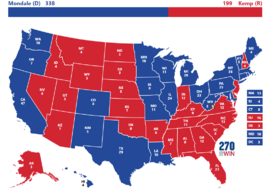1988 United States presidential election (ROMW)
| |||||||||||||||||||||||||||||
All 538 electoral votes of the Electoral College 270 electoral votes needed to win | |||||||||||||||||||||||||||||
|---|---|---|---|---|---|---|---|---|---|---|---|---|---|---|---|---|---|---|---|---|---|---|---|---|---|---|---|---|---|
| Opinion polls | |||||||||||||||||||||||||||||
| Turnout | 50.4% | ||||||||||||||||||||||||||||
| |||||||||||||||||||||||||||||
 Presidential election results map. Blue denotes states won by Mondale/Bentsen, and red denotes those won by Kemp/Bush. Numbers indicate electoral votes cast by each state and the District of Columbia. | |||||||||||||||||||||||||||||
| |||||||||||||||||||||||||||||
The 1988 United States presidential election was the 51st quadrennial presidential election. Taking place on November 8, 1988, it saw incumbent Democratic President Walter Mondale defeating the Republican nominee, U.S. Representative Jack Kemp and his running mate, former Vice President George H. W. Bush.
Owing to his positive track record as the incumbent president, Mondale faced minimal opposition in the Democratic primaries, while on the Republican side, former President Ronald Reagan chose not to reclaim the presidency, while U.S. Representative Jack Kemp of New York went on to secure the Republican nomination, and chose former Vice President George H. W. Bush as his running mate.
Despite facing a more moderate Republican opponent, Mondale nonetheless ran an aggressive campaign centered around his successes as the incumbent, while also stoking fear that a Republican return to the presidency would supposedly result in a return of former President Ronald Reagan's controversial economic policies, known as Reaganomics. On the other hand, Kemp attempted to position himself as a more moderate and encompassing Republican compared to the heavily conservative Ronald Reagan, while also accusing Walter Mondale of having veered to the extreme left of the political spectrum, as supposedly indicated by Mondale's open support for the Equal Rights Amendment. In the end, Mondale handily defeated Kemp with a total of 339 electoral votes (a slight increase from 313 in the previous election) to Kemp's 199. Moreover, while Kemp did successfully flip the states of Georgia and Tennessee, Mondale otherwise retained most of the states that he won in the previous election, while also flipping the states of Colorado, Connecticut, Maine, and most importantly, Texas, which last went for Democrat Jimmy Carter in 1976.
With Mondale's victory, he became the first Democratic president since Franklin D. Roosevelt to ever be re-elected, and the first former vice-president to be re-elected as president after Republican Richard Nixon, who was previously vice president under Dwight D. Eisenhower.
